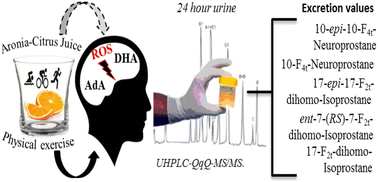Lipidomic approach in young adult triathletes: effect of supplementation with a polyphenols-rich juice on neuroprostane and F2-dihomo-isoprostane markers
Abstract
The aim of the this study was to determine the effect of a polyphenols-rich juice (aronia-citrus juice, ACJ) on F4-neuroprostanes and F2-dihomo-isoprostanes—markers of oxidative stress associated with the central nervous system (CNS)—in 16 elite triathletes under a controlled diet for triathlon training (145 days). In the triathletes, a decrease of the lipid peroxidation markers after ACJ intake, associated with neuronal membrane degradation (10-epi-10-F4t-neuroprostane and 10-F4t-neuroprostane), was observed when compared with placebo stage values. Regarding the F2-dihomo-isoprostanes, a significant decrease of the neuromotor system damage biomarkers (17-F2t-dihomo-isoprostane) with an increase of training load during the study was observed, although the decrease of the load training at the last stage showed a significant increase of the values of ent-7-(RS)-7-F2t-dihomo-IsoP, suggesting a possible role in adaptation post-training. On the other hand, the changes in the excretion of 17-epi-17-F2t-dihomo-IsoP provided a positive connection between physical exercise and ACJ intake. Thus, the results showed in this clinical study in young triathletes will help to elucidate novel interactions and mechanisms between the excretion of lipid peroxidation metabolites from CNS, supplementation of polyphenols-rich juice in the diet and physical exercise during a training season.


 Please wait while we load your content...
Please wait while we load your content...